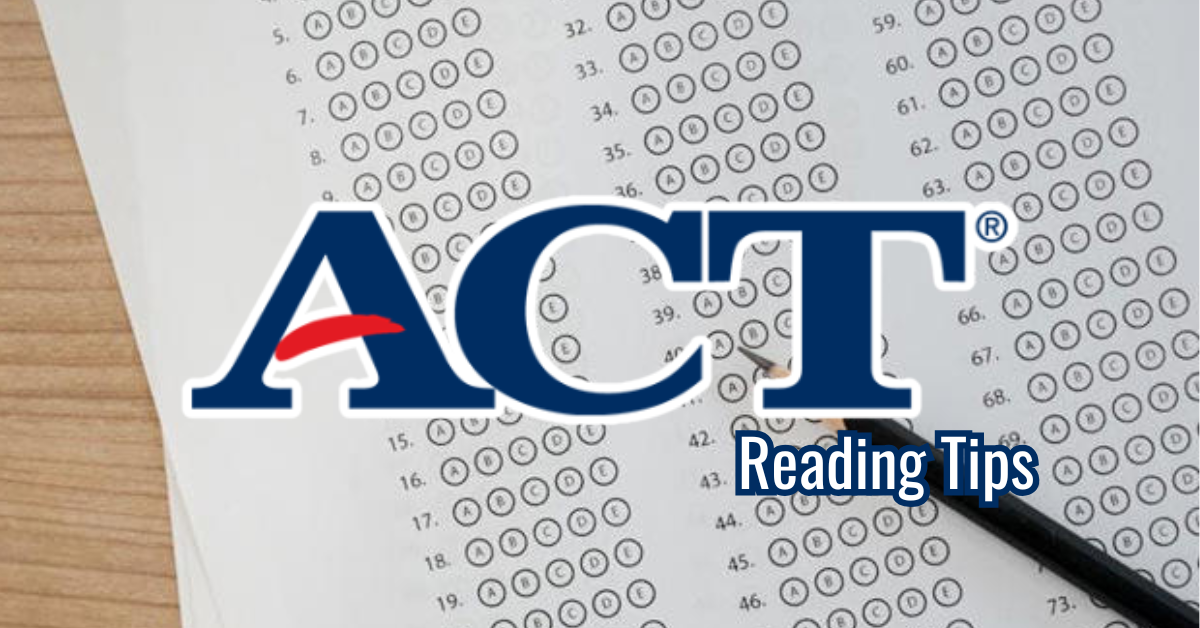The ACT Reading section can feel kind of…weird.
If you’re not a big reader, just looking at four full passages might already be stressing you out. Or maybe you are a reader, but with the ACT coming up, you’ve spent most of your study time memorizing math formulas, brushing up on grammar rules, and figuring out science charts…and now you’re thinking, “Wait, how do I even study for the reading part?”
You’re not alone. The Reading section can feel a bit elusive. It’s not like the Math section where you can just drill practice problems, or the English section where you memorize rules. Reading feels harder to “crack”.
But here’s the good news: there are strategies that work. The 11 ACT reading tips we will share with you today will help you stay calm, read smarter, and walk in feeling way more prepared.
Even if you only apply a few, you’ll already have an edge…though we definitely recommend going for all 11 if you can.
And if you’re also brushing up on grammar, don’t miss our favorite ACT English tips to help you boost your score across the board.
11 ACT Reading Tips
1. Get to Know the ACT Reading Section
Before you start to think of more advanced ACT reading strategies, it helps to know what you’re dealing with.
The ACT Reading section has:
- 40 questions
- 4 reading passages
- 35 minutes total
So yeah… less than 9 minutes per passage (including answering 10 questions each). Time management is the whole game. Keeping this in mind will help you not get stuck on any singular question for too long.

2. Know the Passage Types
You should also be aware that there are different types of passages that will each require different skills and will come with their own questions.
The ACT reading section includes four passage types:
- Prose Fiction (aka a slice of a novel): Expect characters, dialogue, emotions, and tone. You’ll need to read between the lines and understand how characters feel or interact.
- Social Science: Think psychology, sociology, or historical commentary. These are usually fact-based and logical, but they may test how well you can interpret arguments or evidence.
- Humanities: Covers art, literature, music, or philosophy. You might see opinions and analysis here, so be ready to deal with abstract ideas or a strong author voice.
- Natural Science: Biology, chemistry, environmental science…you name it. These are packed with info, but the tone is usually dry and objective. It’s usually smart to skim for the main idea and then locate details.
Getting familiar with each type will help you be able to adjust your reading approach and avoid being surprised on test day.
3. Skim Like a Pro
You might be surprised to hear this, but: Reading every word is not necessary.
Instead, skim for:
- Main ideas
- Topic sentences
- Tone shifts
- Structure (where things are located)
Just keep in mind that you’re not reading for fun. You’re reading with a mission.
4. Focus on the Big Picture
Don’t get lost in the details too soon. A lot of questions ask about the author’s main point, the overall tone, or why they included certain examples.
So always ask yourself:
“What’s the big idea here?”
If you know the core message, then answering those questions gets a whole lot easier.

5. Use Line References Smartly
When a question gives you line numbers (like “In line 42…”), go back and read around it. Don’t just read the one sentence and disregard everything else. Check 2–3 lines before and after. Context is everything.
6. Work Backwards from the Answers
Here’s a trick: read the question, skim the answer choices, and then go back to the passage to search for what actually matches. You’ll save time and avoid getting lost in the text.
7. Eliminate, Eliminate, Eliminate
Most ACT questions have at least two wrong answers that are obviously off. Does something sound too dramatic? Or slightly off-topic? Only half true? Get rid of them. Then make your best choice between what’s left.

8. Don’t Get Stuck
Some questions are tough. That’s okay. But spending 5 minutes on one tricky question is not ideal.
If you’re not sure, circle it and move on. Come back later if there’s time. Getting stuck early can throw off your entire section.
9. Practice With Real ACT Reading Questions
Practice might not always make perfect, but it makes progress. Use real ACT reading practice tests to spot patterns and build your skills.
- Time yourself
- Track your accuracy
- Review explanations (even for questions you got right)
Need prep materials? Try The Official ACT Prep Guide or ACT Made Simple. And for more strategies, check out these general ACT tips.
10. Learn to Spot Trap Answers
Some wrong answers sound convincing…but they’re traps. ACT loves to include choices that:
- Use the right words but twist the meaning
- Are true in real life but not supported by the passage
- Are overly dramatic (that’s a red flag for sure)
Practice spotting these traps, and your score will thank you.

11. Read for Fun (Seriously)
Yes, really.
Reading regularly (even just 15 minutes a day) can build your speed and comprehension. Try articles, essays, or short fiction. Anything that feels just a little smarter than scrolling TikTok.
If you’re already a big bookworm, then this should be an easy tip to follow. And if you’re not the biggest reader yet, try to find a genre that sounds interesting. Even if it’s “just” an action-packed thriller or a spicy romance novel, that’s still a win.
The more you read, the more you get exposed (and used) to writing styles, correct grammar, spelling and punctuation. You also gain skills like being able to read faster (reading speed) and being able to understand the materials quicker (reading comprehension). These skills can even help you with the other ACT sections (like English and even Science).
Apply Our ACT Reading Section Tips For Success
The ACT Reading section is about reading smarter. With the right tips, a bit of practice, and a calm mindset, you can go into the ACT with confidence.
Of course, don’t forget to prepare for the other ACT sections. But if you do follow the 11 tips for ACT reading we shared in this blog, you’re setting yourself up for success on the reading part.
And one extra tip: don’t stress when you’re taking the test and feel overwhelmed by any of the texts or questions. Even if the first passage is a wild one about 18th-century farming methods (ugh), take a breath. You’re not alone, and you’re more prepared than you think.


